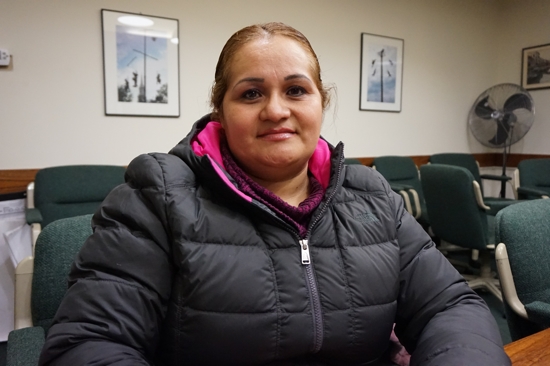
Aliyya Swaby Photo
Elvira Gutierrez Vargas said her bosses robbed her of the Christmas tips she received after spending more than 50 hours each week cleaning houses throughout New Haven for minimum wage.
Now she is one of five domestic workers filing a federal civil suit against Auntie Bella cleaning company, claiming the company did not pay them for all their hours of work, and often reduced their paychecks without explanation.
They will join other domestic workers in testifying before the Board of Alders Thursday at 6 p.m., at a meeting sponsored by Westville Alder Darryl Brackeen, encouraging them to endorse a state Domestic Worker Bill of Rights. Vargas (pictured above) said she hopes the bill will prevent wage theft from happening to others like her.
Auntie Bella is a house-cleaning company based out of West Haven, owned and managed by a couple, Ana Siatoya and Luis Chavez. Vargas was one of Auntie Bella’s first employees in Oct. 2006. At the time the company had fewer than 10 clients. Now it has hundreds, Vargas said. She said she cleaned between eight and ten different houses each day.
Every day, she said, she got to the office before 7:30 a.m., before driving over to the houses she had to clean. She she was paid for only the time actually spent in the houses cleaning, not for travel or for preparation. Over eight years, she said, her salary never increased, though she was promised a wage bump after three months. An immigrant from Guatemala in 2005, Vargas speaks Spanish. She does not speak, read or write English.
Vargas said her bosses often called her useless and illiterate because she does not know English. She said she was doing her job well, navigating and arriving on time to all of her assignments and early to work every day.
“Es mucha discriminacion. Y nosotros estan haciendo eso para que ya no sigan haciendolo con las demas personas,” she said. “It’s a lot of discrimination. And we are doing this so they don’t continue doing it to all the other people.”
Chavez sent a statement to the Independent by text message: “As a small business owner with a growing company you always become a target for unscrupulous people but I believe in justice and may the truth prevail.”
The company’s website states that it “compl[ies] with all labor and tax laws” and offers employees multiple bonuses including “once in a while a surprise bonus to their regular salary.” The site states the company tries to improve the “English knowledge” of its workers by offering them English classes before work. All employees are “legally authorized to work in this country without exceptions,” the site states.
Vargas disputed all of these claims. She herself is undocumented, she said, which is why she stayed at Auntie Bella so long, scared to seek legal help or to try to find another job.
On Jan. 9, the women confronted their manager, Chavez, about the allegedly stolen Christmas tips and lack of lawful wages. He fired them that day and took their keys to the homes they serviced, Vargas said. After they contacted New Haven Legal Assistance to file a lawsuit against Auntie Bella, the company’s managers denied the claims.
“Defendants responded by sending a letter to Plaintiffs’ counsel alleging that Plaintiffs stole from them, stole from homeowners, abandoned their jobs, and slandered Defendants by asking to have a conversation about the unpaid wages. All of these allegations are demonstrably false and were fabricated in order to deter Plaintiffs from filing this Complaint with the Court,” according to the suit filed by their lawyer, James Bhandary-Alexander.
State labor law has excluded protecting domestic workers for 80 years, Bhandary-Alexander said, likely because “people don’t think that their work is work.” He said that the people — predominately women of color — who clean houses and care for children and the elderly, allow other professionals to do their jobs.
The state legislature created a task force to examine the way domestic workers have been excluded from legal protections guaranteeing workers’ compensation and sick days, and preventing employer discrimination. Domestic workers have some “rights on paper,” but those are rarely enforced, said Bhandary-Alexander. “We hope Connecticut will recognize that these people need all the rights everyone else has. They have to give them protection.” (State Sen. Gary Winfield, in file video, has pushed that bill in previous years.)
Bhandary-Alexander said he hopes the Board of Alders agrees to back the state proposal to give workers those rights.
Vargas has found new work. She works two or three days at a cleaning company where she makes $10 per hour, which she said is “better” than her previous job. She said she was scared, until finally she was fed up, and decided she wanted to change things.
“Somos las personas de que mas duros trabajamos y somos las mas discriminadas. Lo peor es que los mismos compañeros latinos son los que nos estan explotando,” she said. “We are the people who work the hardest and are the most discriminated against. The worst thing is that fellow Latinos are the ones who are exploiting us.”